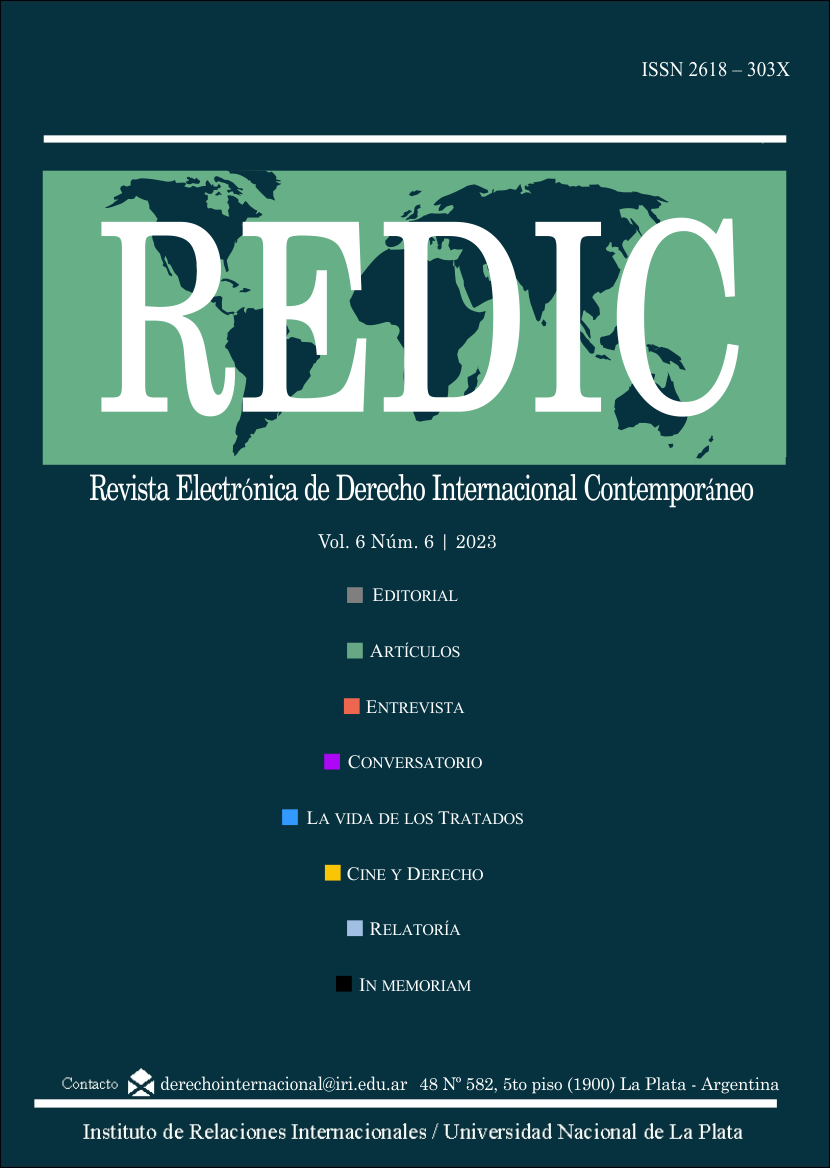La Corte Penal Internacional frente al espejo
A 25º años de la adopción del Estatuto de Roma
DOI:
https://doi.org/10.24215/2618303Xe054Palabras clave:
justicia penal internacional, universalidad, prospectiva, logrosResumen
La conmemoración del 25º aniversario de la adopción del Estatuto de Roma (ER) de la Corte Penal Internacional (CPI), acaecida el 17 de julio de 1998, ofrece motivos sobrados para repensar la labor que esta institución viene desempeñando desde hace más de dos décadas. Tanto la propia CPI como la doctrina ius internacionalista destacan la importancia de contar con balances y hojas de ruta periódicos para mejorar su funcionamiento. En esa línea, el objetivo del presente trabajo consiste en examinar, sin ánimo de exhaustividad, aquellos logros que, con sus luces y sombras, conforman las señas de identidad de la CPI, trazando una línea de continuidad a modo de puente entre el pasado y el presente, imprescindible para anticipar su futuro. Analizaremos la evolución experimentada y los avances alcanzados por la CPI recurriendo al método deductivo y a su propia jurisprudencia, para finalizar con una reflexión crítica sobre algunos de los grandes retos pendientes con el propósito de contribuir, siquiera de forma modesta, a impulsar el progreso de la CPI y promover el reconocimiento de su rol clave en la lucha global contra la impunidad.
Referencias
Abrisketa Uriarte, J. (2016). Al Bashir: ¿excepción a la inmunidad del Jefe de Estado de Sudán y Cooperación con la Corte Penal Internacional? Revista Española de Derecho Internacional, 68(1), 19-47. https://www.revista-redi.es/redi/article/view/767
Barbé Izuel, E. (2016). Contestación normativa y Consejo de Seguridad: la agenda de mujeres, paz y seguridad o de la resolución 1325 a la resolución 2242. Revista Española de Derecho Internacional, 68(2), 103-131. https://www.revista-redi.es/redi/article/view/729
Benyera, E. (2023). Neither child soldier nor warlord but a survivor: Dominic Ongwen and the need for survivors´ justice in international criminal justice. African Security Review, 32(3), 275-288. https://doi.org/10.1080/10246029.2023.2198998
Bollo Arocena, M. D. (2023). Agresión rusa a Ucrania, crímenes internacionales y Corte Penal Internacional. Anuario Español de Derecho Internacional, 39, 101-148. https://doi.org/10.15581/010.39.101-146
Boschiero, N. (2015). The ICC judicial finding on non-cooperation against the DRC and no immunity for Al-Bashir based on UNSC Resolution 1593. Journal of International Criminal Justice, 13(3), 625-653. https://doi.org/10.1093/jicj/mqv034
Bower, A. (2019). Contesting the International Criminal Court: Bashir, Kenyatta, and the Status of the Nonimpunity Norm in World Politics. Journal of Global Security Studies, 4(1), 88-104. https://doi.org/10.1093/jogss/ogy037
Broache, M. P., Cronin-Furman, K., Mendeloff, D. y McAllister, J. (2023). The International Criminal Court at 25. Journal of Human Rights, 22(1), 1-3. https://doi.org/10.1080/14754835.2022.2150518
Broache, M. P. y Kore, J. (2023). Can the International Criminal Court prevent sexual violence in armed conflict? Journal of Human Rights, 22(1), 78-92. https://doi.org/10.1080/14754835.2022.2150517
Cartes Rodríguez, J.B. (2019). Reflexiones en torno a la inmunidad de jurisdicción penal de los Jefes de Estado ante la comisión de crímenes internacionales en el marco del Estatuto de Roma. Anuario Español de Derecho Internacional, 35, 487-531. https://doi.org/10.15581/010.35.487-531
Cox, F. (2021). Algunas consideraciones sobre la condena de la Corte Penal Internacional a Dominic Ongwen. Anuario de Derecho Público, (1), 585-604. https://derechopublico.udp.cl/anuario/
Del Carpio, J. (2009). Las víctimas ante los tribunales penales internacionales ad hoc. Tirant lo Blanch.
Díaz Galán, E. (2023). Venezuela ante la Corte Penal Internacional (CPI): algunas cuestiones sobre el crimen de lesa humanidad. YachaQ: Revista de Derecho, (14), 165-184. https://revistas.unsaac.edu.pe/index.php/ry/article/view/1067
Díaz Villamil, M. D. (2022). Dominic Ongwen en la Corte Penal Internacional: un análisis feminista sobre crímenes internacionales y subjetividades complejas en la guerra. Discusiones, 28(1), 131-156. https://doi.org/10.52292/j.dsc.2022.3338
Escobar Hernández, C. (2018). La Corte Penal Internacional en construcción: nuevos retos veinte años después de la Conferencia de Roma. Revista Española de Derecho Internacional, 70(2), 209-215. https://www.revista-redi.es/redi/article/view/603
Escobar Hernández, C. (2022). Ucrania y la Corte Penal Internacional: una oportunidad para la Corte y para la lucha contra la impunidad. Revista Española de Derecho Internacional, 74(2), 57-76. https://www.revista-redi.es/redi/article/view/95
Galván, E. R. (2019). La reparación de las víctimas en la jurisprudencia de la Corte Penal Internacional. Derechos en Acción, 4(13), 423-450. https://doi.org/10.24215/25251678e345
García Iommi, L. (2023). Nothing changed after Rome: continuity in state support for the International Criminal Court. Journal of Human Rights, 22(1), 16-30. https://doi.org/10.1080/14754835.2022.2157206
García Ruíz, C. R. (2017). El papel de las ONGs en el sistema de la Corte Penal Internacional. Anuario Español de Derecho Internacional, 33, 310-336. https://doi.org/10.15581/010.33.309-336
García San José, D. (2006). El derecho a la justicia de las víctimas de los crímenes más graves de trascendencia para la comunidad internacional. Revista Española de Derecho Internacional, 58(1), 119-145. https://www.revista-redi.es/redi/article/view/1203
Gil Gandía, C. (2020). La reparación de las víctimas de crímenes internacionales y la Corte Penal Internacional. Thomson Reuters Aranzadi.
Guilfoyle, D. (7 de octubre de 2020). The International Criminal Court Independent Expert Review: questions of accountability and culture, EJIL:Talk! https://www.ejiltalk.org/the-international-criminal-court-independent-expert-review-questions-of-accountability-and-culture/
Hassan, F. M., Mohd Rusli, M. H. B. y Ahmad Tajudin, A. (2022). Malaysia and the Rome Statute of the International Criminal Court. Brawijaya Law Journal: Journal of Legal Studies, 9(1), 76–89. https://doi.org/10.21776/ub.blj.2022.009.01.06
Helfer, L. R. y Showalter, A. E. (2017). Opposing International Justice: Kenya’s integrated backlash strategy against the ICC. International Criminal Law Review, 17(1), 1-46. iCourts Working Paper Series No. 83, Duke Law School Public Law & Legal Theory Series No. 2017-13. http://dx.doi.org/10.2139/ssrn.2885435
Hellman, J. (2017). Inmunidad diplomática en el marco del Estatuto de Roma. Anuario de Derecho Diplomático y Consular, (2), 1-15.
Hirsch Ballin, E. (2019). The Value of International Criminal Justice: how much International Criminal Justice can the world afford? International Criminal Law Review, 19(2), 201-213. https://doi.org/10.1163/15718123-01806003
Hodgson, N. (2023). Victims as agents of accountability: strengthening victims’ right to review at the International Criminal Court. Criminal Law Forum, 34(3), 273-294. https://doi.org/10.1007/s10609-023-09458-8
Hyun Song, S. (17 de julio de 2018). Past Achievements and Future Challenges of the ICC. [Discurso] 20th Anniversary of the Rome Statute. International Criminal Court. The Hague, The Netherlands.
Iglesias Vázquez, M. A. (2020). África y la Justicia Internacional: una agitada relación. Deusto Journal of Human Rights, (6), 153-177. https://doi.org/10.18543/djhr.1910
Keitner, C. I. (2019). The ICC and Non-Party States: consistency and consensus revisited. Georgia Journal of International and Comparative Law, 47, 629-634. https://digitalcommons.law.uga.edu/gjicl/vol47/iss3/4/
Kim, H. (2017). Missed opportunities in the judicialisation of international criminal law? Asian states in the emergence and spread of the Rome Statute system to punish atrocity crimes. Netherlands Quaterly of Human Rigths, 35(4), 246-271. https://doi.org/10.1177/0924051917737911
Lirola Delgado, I. y Martín Martínez, M. M. (2001). La Corte Penal Internacional. Justicia vs. Impunidad. Ariel.
Lirola Delgado, I. y Martín Martínez, M. M. (2013). Los crímenes de naturaleza sexual en el Derecho Internacional Humanitario. Informes 8/2013. Institut Català Internacional per la Pau.
Lirola Delgado, I. y Martín Martínez, M. M. (2016). Crímenes internacionales de violencia sexual y conflictos armados. Tirant Lo Blanch.
Lirola Delgado, I. y Martín Martínez, M. M. (2018). El diálogo jurisdiccional interregional en la investigación y sanción de la violencia sexual. Araucaria: Revista Iberoamericana de Filosofía, Política, Humanidades y Relaciones Internacionales, 20(40), 511-575. https://revistascientificas.us.es/index.php/araucaria/article/view/6603
Lohne, K. (2017). Global civil society, the ICC, and legitimacy in International Criminal Justice. En N. Hayashi, C. M. Bailliet y J. Nicholson (Eds.), The Legitimacy of International Criminal Tribunals. Cambridge University Press. https://doi.org/10.1017/9781316536469.019
López Martín, A. G. (2020). Sobre inmunidades (de los Jefes de Estado y de Gobierno) en tiempos de pandemia. Foro. Revista de Ciencias Jurídicas y Sociales, Nueva Época, 23(2), 21-54. https://doi.org/10.5209/foro.77678
Martín Martínez, M. M. (2014). Iberoamérica y la Corte Penal Internacional: logros y retos de una interacción compleja e inacabada. Araucaria: Revista Iberoamericana de Filosofía, Política, Humanidades y Relaciones Internacionales, 16(32), 359-381. ttps://revistascientificas.us.es/index.php/araucaria/article/view/784
Martín Martínez, M. M. (2022). Violence against Men as a method of warfare in contemporary conflicts: some lessons learned. En P. A. Fernández Sánchez (Ed.), The limitations of the law of armed conflicts. New means and methods of warfare: essays in memory of Rosario Domínguez Matés (pp. 356-377). Brill.
Ministerio de Asuntos Exteriores, Unión Europea y Cooperación. (6 de diciembre de 2022). Nota 095. España aumenta su contribución económica al Tribunal Penal Internacional (TPI) para financiar las investigaciones sobre la guerra de Ucrania [Comunicado de prensa]. https://www.exteriores.gob.es/es/Comunicacion/NotasPrensa/Paginas/2022_NOTAS_P/20221206_NOTA095.aspx
Moran, C. F. (2023). The authority of International Criminal Court: a controversial concept. Cambridge University Press. https://doi.org/10.1017/9781108678629
Nortje, W. (2023). The sexual abuse of African boy soldiers by male and female offenders: the need for an International Criminal Law response. International Criminal Law Review, 1-23. https://doi.org/10.1163/15718123-bja10152
Olásolo Alonso, H. y Kiss, A. (2010). The role of victims in criminal proceedings before the International Criminal Court. Revue International de Droit Penal, 81, 125-163. https://doi.org/10.3917/ridp.811.0125
Olásolo Alonso, H., Carnero Rojo, E., Seoane, D. B. y Carcano, L. (2018). El limitado alcance de las actuaciones de la Corte Penal Internacional en su decimoquinto aniversario y sus posibles causas. En H. Olásolo Alonso, N. E. Buitrago Rey, V. Bonilla Tovar y J. Canosa Cantor (Coords.), Alcance y limitaciones de la justicia internacional, 4. Tirant Lo Blanch.
Oloka-Onyango, J. (2020). Unpacking the African Backlash to the International Criminal Court (ICC): The case of Uganda and Kenya. Strathmore Law Journal, 4(1), 41-68. https://doi.org/10.52907/slj.v4i1.44
Orihuela Calatayud, E. (2014). ¿Justicia restaurativa para las víctimas? El papel de la Corte Penal Internacional. En J. Soroeta Liceras (Coord.), Conflictos, nuevos colonialismos y derechos humanos en una sociedad internacional en crisis, Anuario de los Cursos de Derechos Humanos de Donostia-San Sebastián, XIII (pp. 23-82). Thomson Reuters-Aranzadi.
Pascual Serrats, R. (2023). Las víctimas del delito y su participación en el proceso ante la Corte Penal Internacional. Revista Boliviana de Derecho, (35), 290-331. Recuperado a partir de https://www.revista-rbd.com/numero-35/
Pineros Polo, E. (2020). Primera condena de la Corte Penal Internacional por destrucción de patrimonio histórico en Tombuctú: el caso Al Mahdi. Eunomía. Revista en Cultura de la Legalidad, 18, 104-129. https://doi.org/10.20318/eunomia.2020.5266
Republic of South Africa, The Presidency. (19 de julio de 2023). South Africa finalises 15th BRICS Summit format. https://www.thepresidency.gov.za/press-statements/south-africa-finalises-15th-brics-summit-format
Rodríguez-Villasante y Prieto, J. L. (2006). El proceso de aprobación y desarrollo del Estatuto de Roma de la Corte Penal Internacional. En J. L. Rodríguez-Villansante y Prieto (Coord.), El derecho internacional humanitario ante los retos de los conflictos armados actuales (pp. 157-178). Marcial Pons.
Skilbeck, R. (2008). Funding Justice: the price of war crimes trials. Human Rights Brief, 15(3).
Tshitshi Ndouba, K. (2021). El andamiaje del regionalismo internacional penal africano: problemas y perspectivas. Anuario Mexicano de Derecho Internacional, XX, 459-491. https://doi.org/10.22201/iij.24487872e.2020.20.14483
Trahan, J. (2018). From Kampala to New York. The final negotiations to activate the jurisdiction of the international criminal court over the crime of aggression. International Criminal Law Review, 18(2), 197-243. https://doi.org/10.1163/15718123-01802003
Vacas Fernández, F. (2022). El final del examen preliminar sobre la situación de Colombia ante la Corte Penal Internacional: ¿éxito de la estrategia de complementariedad positiva de la Fiscalía o cierre en falso? Anuario Español de Derecho Internacional, 38, 287-339. https://doi.org/10.15581/010.38.287-339
Yáñez-Barnuevo García, J. A. (2000). La Conferencia de Roma y el Estatuto de la Corte Penal Internacional: balance y perspectivas. En C. Escobar Hernández (Ed.), Creación de una jurisdicción penal internacional (pp.17-28). Colección Escuela Diplomática.
Zaldivar-Giuffredi, A. M. (2018). Simone Gbagbo: first lady of Cote D'Ivoire, first woman indicted by the International Criminal Court, one among many female perpetrators of crimes against humanity. ILSA Journal of International and Comparative Law, 25(1), 1-32.
Zappalá, S. (2010). The rights of victims v. the rights of the accused. Journal of International Criminal Justice, 8(1), 137-164. https://doi.org/10.1093/jicj/mqq001
Archivos adicionales
Publicado
Número
Sección
Licencia
Derechos de autor 2023 Magdalena María Martín Martínez

Esta obra está bajo una licencia internacional Creative Commons Atribución-NoComercial-CompartirIgual 4.0.
Aquellos autores/as que tengan publicaciones con esta revista, aceptan los términos siguientes:
- Los autores/as conservarán sus derechos de autor y garantizarán a la revista el derecho de primera publicación de su obra, el cuál estará simultáneamente sujeto a la Licencia de reconocimiento de Creative Commons (BY-NC-SA) 4.0 que permite a terceros compartir la obra siempre que se indique su autor y su primera publicación esta revista, no se haga uso comercial, y si se remezcla, se transforma o se crea a partir del material, se debe distribuir bajo la misma licencia del original.
- Los autores/as podrán adoptar otros acuerdos de licencia no exclusiva de distribución de la versión de la obra publicada (p. ej.: depositarla en un archivo telemático institucional o publicarla en un volumen monográfico) siempre que se indique la publicación inicial en esta revista.
- Se permite y recomienda a los autores/as difundir su obra a través de Internet (p. ej.: en archivos telemáticos institucionales o en su página web) antes y durante el proceso de envío, lo cual puede producir intercambios interesantes y aumentar las citas de la obra publicada. (Véase El efecto del acceso abierto).































